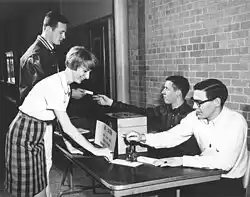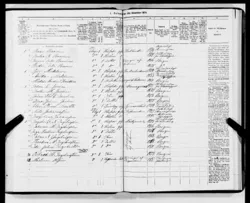Voter records refers to records that document registered voters and voting, including voter lists and poll tax receipts. Voter records are kept on various government levels and are similar to census records. However, unlike a federal census that counts nearly all citizens, voting records only document those who have the right to vote and who choose to vote. Therefore, they are less reliable than other genealogically relevant records documenting a time and place.
Research your ancestors on MyHeritage
Benefits of voter recordsBenefits of voter records

Voter records are a type of "name list.” They place an individual in a specific location and time. Aside from the personal details they reveal about a person, namely political party affiliation, naturalization information, and women’s marital status, they also help fill in the gaps between census years.
Voter records are different from location to location in terms of what they contain. They will likely include:
- Date
- Location
- Election type
- Person's Name
- Age
- Address
- Race
- Political Affiliation
- Occupation
- Place of birth
- Naturalization (court, date)
- Husband's name (married woman)
- Marital Status (for women, due to the inclusion of Miss or Mrs.)
- Signature
- Tax amount (if a poll tax receipt)
Researching voter recordsResearching voter records

MyHeritage offers a collection of voter lists and census records that span from different parts of the world, including the United States, Canada, Europe, and Australia. These lists provide a wealth of information on individuals, such as their name, age, occupation, address, political affiliation, and voting history, as can be found in the following collections:
The limitations of voter recordsThe limitations of voter records
While voter records confirm an ancestor's time and place, they are of limited use for researching all ancestors for three reasons.
One, not everyone had the right to vote throughout history. Suffrage laws differ per country and region. Sometimes, a person could be enfranchised and disenfranchised for various reasons, some outside their control. Voting rights may have been granted only for those of a certain gender, age, education, land ownership, or wealth. For example, early voting in the United States was primarily done by landowning white men who were 21 years of age. However, not all white men were granted suffrage. Suffrage law changed over time and according to state.
African American men were granted suffrage with the passage of the 15th amendment (ratified 1870), and Native American men lacked suffrage rights until the 20th century. However, even when these groups gained voting rights, racism, violence, tests, and poll taxes made exercising those rights difficult, if not impossible.
Second, when using these records, we must remember that not everyone who could vote wanted to vote. So some citizens may have purposefully excluded themselves from voting.
Lastly, keep in mind that not all of these records are extant, meaning they may have been destroyed or lost over time. Researchers need to verify that their ancestors had the right to vote and that those records still exist to make use of them.
Women's suffrageWomen's suffrage
See also: Women's suffrage
When researching female ancestors in voter records, it's important to take into account that women did not have the right to vote in many countries until well into the 20th century. Be sure to research women's suffrage in the region your female ancestor lived to understand when she might appear in local voter records.
Barriers to votingBarriers to voting
As mentioned previously, not everyone could vote historically. Barriers to voting included:
- Citizenship Rights
- Marriage (loss of citizenship)
- Racism
- Lack of land or finances
- Gender
- Lack of interest in politics
Availability of voter recordsAvailability of voter records
Not all voter records survive. Voting records are found mainly in archives, but some online resources containing them exist, including MyHeritage. Once you check online resources, consult state/county archives and historical societies for possible records.
Search for census and voter listsSearch for census and voter lists
Explore more about voter recordsExplore more about voter records
- Census and voter lists at MyHeritage
- Genealogy Basics Chapter 3: Discovering Historical Records at MyHeritage Blog

